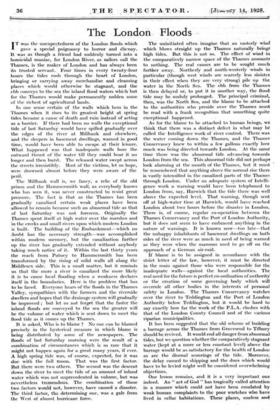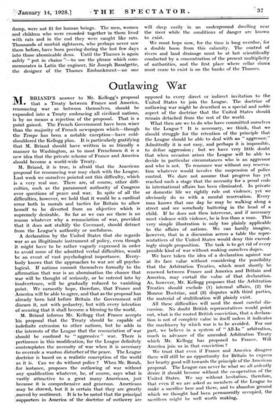The London Floods
Ir was the unexpectedness of the London floods. which gave a special poignancy to horror and dismay. It was as though a friend had suddenly turned into a homicidal maniac, for London River, as sailors call the Thames, is the maker of London and has always been its trusted servant. Four times in every twenty-four hours the tides rush through the heart of London, bringing or carrying away merchandise and cleansing places which would otherwise be stagnant, and the ebb conveys to the sea the inland flood waters which but for the Thames would make permanently sodden some of the richest of agricultural lands.
In one sense certain of the walls which hem in the Thames when it rises to its greatest height at spring tides became a cause of death and ruin instead of acting as a barrier. If there had been no walls the exceptional tide of last Saturdair would have spilled gradually over the edges of the river at Millbank and elsewhere, imd the sleepers in basement dwellings, warned in good time, would have been able to escape at their leisure. What happened was that inadequate walls bore the outward thrust of the water till they could bear it no longer and then burst. The released water swept across the streets irresistibly. Most of the victims, let us hope, were drowned almost before they were aware of the peril.
The Millbank wall is, we fancy, a relic of the old prison and the Hammersmith Wall, as everybody knows who has seen it, was never constructed to resist great pressure. The fact i,s that as the Thames has been gradually canalized certain weak places have been allowed to remain because such an abnormal tide as that of last Saturday was not foreseen. Originally the Thames spent itself at high water over the marshes and in the creeks and small rivers upon which modern London is built. The building of the Embankment—which no doubt has the necessary strength—was accomplished within modern memory, but the canalization further up the river has gradually extended without anybody taking much notice of it. Within the last thirty years the reach from Putney to Hammersmith has been transformed by the rising of solid walls all along the Middlesex side. This is a small matter, but it reminds us that the more a river is canalized the more likely it is to cause local flooding when a weakness declares itself in the boundaries. Here is the problem that has to be faced. Everyone hears of the floods in the Thames Valley, sympathizes with the farmers and the riverside dwellers and hopes that the drainage system will gradually be improved ; but let us not forget that the faster the inland floods are conveyed to the sea the greater will be the volume of water which is sent down to meet the flood tide as it comes up the Thames.
It is asked, Who is to blaine ? No one can be blamed precisely in the hysterical measure in which blame is being distributed by some of the newspapers. The floods of last Saturday morning were the result of a combination of circumstances which is so rare that it might not happen again for a great many years, if ever. A high spring tide was, of course, expected, for it was due with the full moon. That was the first factor. But there were two others. The second was the descent down the river to meet the tide of an amount of inland water which-was not unprecedented in volume, but was nevertheless tremendous. The combination of those two factors would not, however, have caused a disaster. The third factor, the determining one, • was a gale from the West of almost hurricane force. The uninitiated often imagine that an easterly wind .which blows straight up the Thames naturally brings' high tides. But this is not 'so. The effect of wind in .the comparatively narrow space of the Thames amounts to nothing. The real causes are to be sought much .further away.. Northerly and north-westerly winds in particular (though west winds are scarcely less sinister in their effect when they are very strong) pile up the water in "the. North Sea. The ebb from the Thames is then delayed or, to put it in another way, the flood tide may be unduly prolonged. The principal criminal, then," was the North Sea, and the -blame to be attached to the authorities who preside over the Thames must be read with a frank recognition that something quite exceptional happened.
. As for the blame to be attached to human beings, we think that there was a distinct defect in what may 14 _called the Intelligence work of river control. There was the water coming down the Thames, and the Thames Conservancy knew to within a few gallons exactly how much was being directed towards London. At the sanW time there was the abnormal tide advancing towards London from the sea. ,This abnormal tide did not perhaps look alarming at the mouth of the Thames, but it must be remembered that anything above the normal rise there is-vastly intensified in the canalized parts of the Thames through London. Under an adequate system of Intelli- gence work a warning would have been telephoned to London from, say, Harwich that the tide there was well above the expected level. That warning, though sent off at high-water time at Harwich, would have reached London about two hours before the disaster in London: There is, of course, regular co-operation between the Thames Conservancy and the Port of London Authority, but it does not seem to have embraced anything in the nature of warnings. It is known now—too late—that the unhappy inhabitants of basement thvellings on both sides of the river were as much in need of being warned as they were when the maroons used to go off on the approach of a German air-raid.
If blame is to he assigned in accordance with the strict letter of the law, however, it must be directed in the main against those who were responsible for the inadequate walls—against the local authorities. The real need for the future is perfect co-ordination of authorit3i or the creation of some governing body which will overrule all other bodies in the interests of personal safety in London. The Thames Conservancy watches over the river to Teddington and the Port of London Authority below Teddington, but it would be hard to say exactly how far the work of the P.L.A. clashes with that of the London County Council and of the various riparian municipalities. . .
It has been suggested that the old scheme of building a barrage across the Thames from Gravesend to Tilbury Should be revived. It would end all danger from abnormal tides, but we question whether the comparatively stagnant water (kept at a more or less constant level) above the barrage would be as satisfactory for the health of London as are the diurnal scourings of the tide. Moreover, the delay caused to shipping and the dues which would have to be levied might well be considered overwhelming • objections. One lesson remains, and it is a very important one indeed. An "act of God" has tragically called attention in a manner which could not have been emulated by weak human complaints to the* poor wretches who have lived in cellar habitations. These • places, sunless and damp, were not fit for human beings. The men, women will sleep easily in an underground dwelling near and children who were crowded -together in them lived-- the river while the conditions of danger arc known with rats and in the end they were caught like rats. to exist.



































 Previous page
Previous page